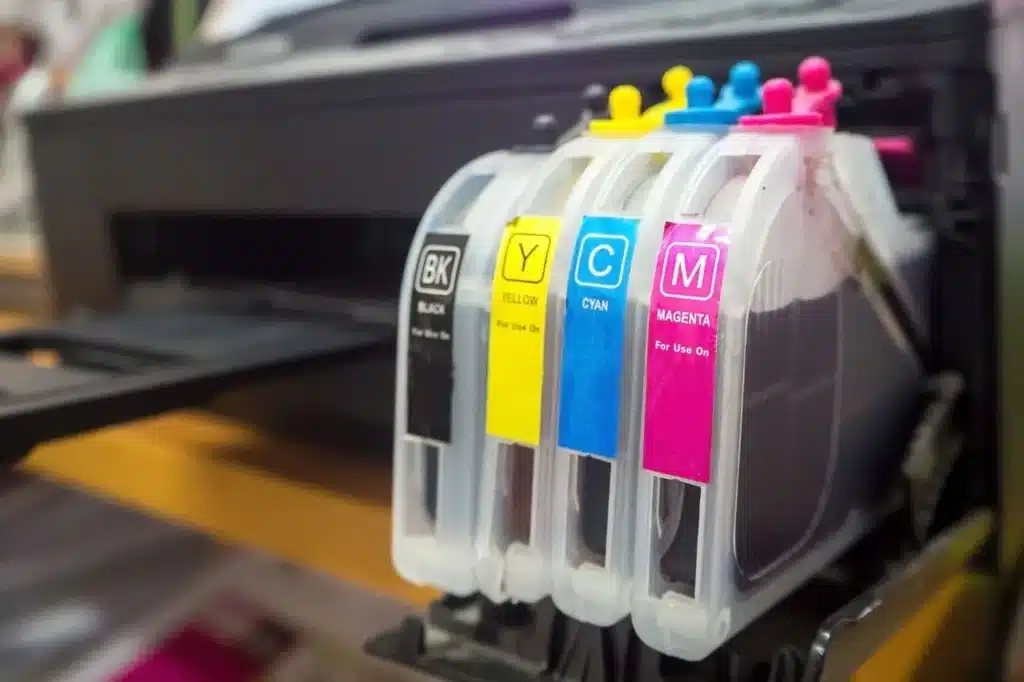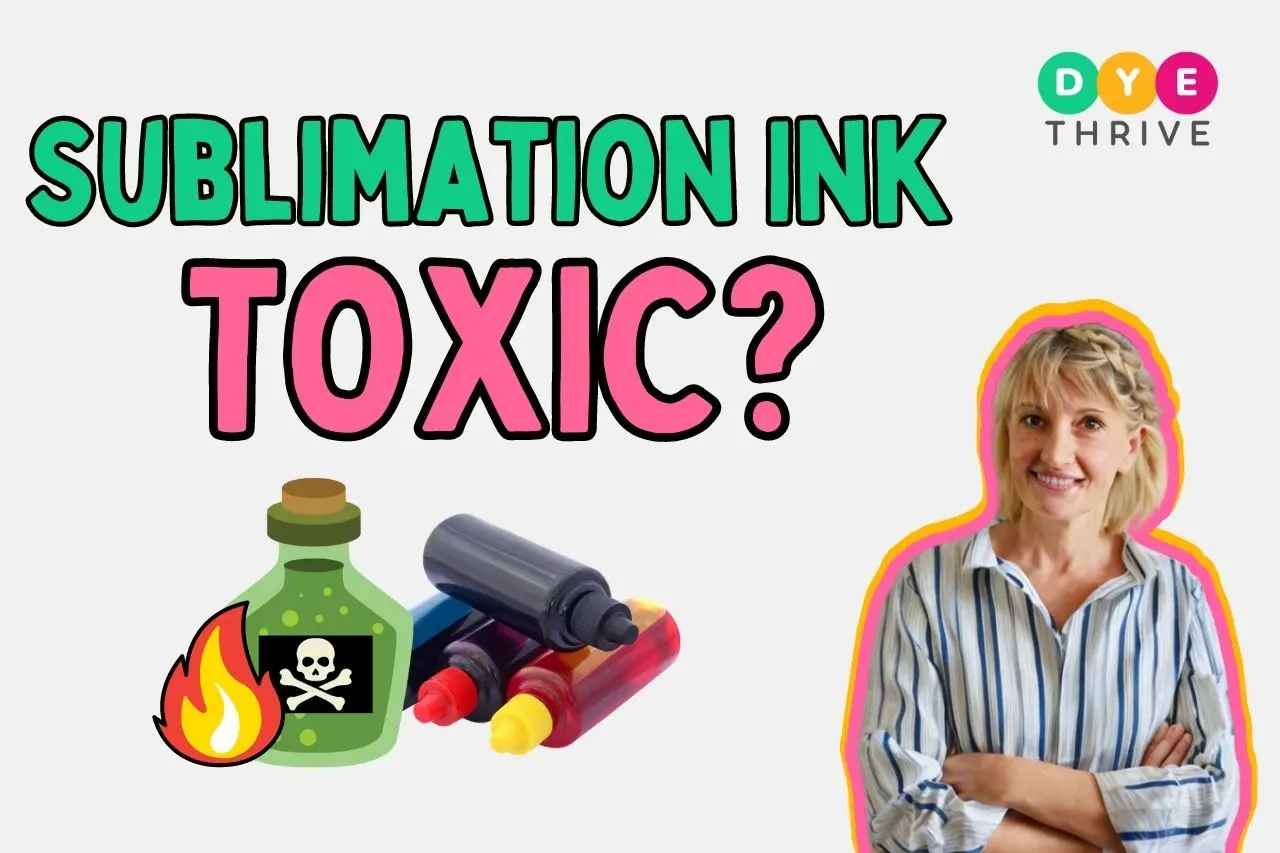Sublimation printing has become increasingly popular in recent years for coloring fabrics, mugs, and other items with vibrant, lasting images.
However, some concerns have been raised over whether the special inks used for sublimation could pose risks for human health.
In this article, we’ll answer the questions like:
- is sublimation ink toxic
- is sublimation dangerous
- is sublimation fumes bad for you
So keep reading.
Is Sublimation Ink Toxic? (Quick Answer)
Sublimation ink is generally considered non-toxic and eco-friendly, though there is some debate regarding its safety.
There are no specific case studies documenting the toxicity of sublimation inks.
Read our article on what is sublimation ink and how doest it work to know more about it.
However, some key points provide insight on the health and environmental impacts:
Why I Think Sublimation Inks Are Safe (My Personal Opinion)
So, let me tell you why I think sublimation inks are totally safe.
First of all, sublimation is the talk of the town these days.
Everyone seems to be using it for all their printing needs. If these inks were actually bad for us, don’t you think there would be some kind of uproar by now?
I mean, people are not just blindly using sublimation inks without any thought, right?
We all care about our health and the environment, after all.
Plus, I’ve been using sublimation inks for years and I haven’t experienced any adverse effects.
I’m still alive and kicking, no crazy symptoms happening over here.
And trust me, if something would have gone wrong, I would have noticed it.
So, yeah, I believe these inks are perfectly safe.
Of course, it’s always important to use them responsibly and follow the manufacturer’s guidelines. But as far as I can tell, sublimation inks are not something to be afraid of.
Also Read: Sublimation Ink Vs Regular Ink (Here’s The Truth…)
Does Sublimation Cause Toxic Fumes
Sublimation as a process does not inherently produce toxic fumes that are hazardous to health.

However, there can be odors emitted during sublimation printing, especially from certain substrates like neoprene.
So if you are wondering are sublimation fumes harmful? then let me tell you the fumes from properly done sublimation are not considered harmful or dangerous.
There are no specific regulations around sublimation fumes, indicating there is no strong evidence they pose safety risks with responsible use.
Odors can be minimized by installing an exhaust system near your heat press or by using an air purifier with a HEPA filter.
It is important to differentiate sublimation from sublimation ink – while sublimation itself does not cause toxic fumes, heating low-quality sublimation inks can generate toxic vapors and fumes containing harmful chemicals.
This addresses the question “is sublimation ink toxic when heated?”
While quality ink selection and precautions like ventilation are advisable, sublimation on its own does not produce severely toxic fumes that are dangerous to health if proper procedures are followed.
So in summary, while sublimation may emit odors, the fumes are not inherently dangerous or bad for your health.
How To Safely Use Sublimation Ink

While sublimation ink is not conclusively toxic, following basic safety practices is still advisable:
Is Sublimation Ink eco-friendly?
Sublimation ink is considered to be a more eco-friendly option compared to other types of ink.
This is due to its specific chemical composition and printing process.
Unlike traditional inkjet ink, sublimation ink does not contain harmful solvents that can have a negative impact on the environment.
Instead, it is made up of a water-based dye that is non-toxic and safe to use.
Additionally, the sublimation process itself also contributes to its eco-friendly nature.
During sublimation printing, the ink is heated to a high temperature, causing it to transform into a gas and then back into a solid.
This process does not involve any chemical reactions or waste, minimizing the environmental footprint.
Furthermore, sublimation inks are known for their vibrant color reproduction and durability, which reduces the need for frequent reprints and waste.
Overall, sublimation ink presents a more sustainable and eco-friendly option for printing needs.
FAQ
Are Sublimation Fumes Harmful?
The fumes from sublimation printing are generally not considered toxic or dangerous to health. With adequate workshop ventilation and responsible practices, exposure to sublimation fumes poses minimal risks.
What Are The Side Effects Of Sublimation Ink?
When used correctly, sublimation inks do not cause significant side effects. The inks bond securely to fabrics with no residue. Any vapor exposure during printing should be controlled with ventilation. Minor skin or eye irritation is possible with excessive contact.
Is It Safe To Drink From A Sublimation Mug?
Yes, sublimation mugs are considered food-safe once the inks have fully cured during printing.
The dyes bond at the molecular level with the polymer coating and will not leach into beverages.
High-quality sublimation inks designed for mugs are non-toxic when cured.
It is also important to note that the sublimation printing is done on the outside of the mug, not the inside surface that contacts food and drink.
This prevents any direct exposure of the inks to consumables. With proper curing, sublimation mugs are safe for drinking.
My Thoughts
Sublimation is a billion-dollar industry, you know?
I mean, if anything to do with sublimation printing was bad for us, people wouldn’t be going crazy over it and the government would have shut that stuff down ages ago.
So in my opinion, sublimation inks are safe to use, just make sure you take proper precautions as mentioned in this article, and keep all your equipment away from children’s reach.
I hope I was able to answer your question on “Is sublimation ink toxic”, let me know in the comment section below if you have any questions, I would love to answer them.
If you enjoyed reading the article, please share it with your friends and family as this motivates me to produce more and more quality content for you.
See you in the next article.





Thank you, this information is spot on for the questions I was wanting answered.
Thankyou so much Donna, I am glad that you got your questions answered 😊!